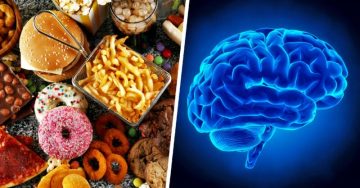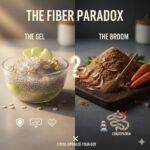 First, let’s get something clear. There’s technically no such thing as “junk food.” There’s food, and there’s junk. Junk food isn’t food. It’s a “food-like substance” that is engineered and manufactured to feel and taste like food, but the ultra-processing turns it into a different category that your body doesn’t recognize as food. It’s just junk, so we’ll call it that from here out.
First, let’s get something clear. There’s technically no such thing as “junk food.” There’s food, and there’s junk. Junk food isn’t food. It’s a “food-like substance” that is engineered and manufactured to feel and taste like food, but the ultra-processing turns it into a different category that your body doesn’t recognize as food. It’s just junk, so we’ll call it that from here out.
Humans have been around for a long time, and only in the last 100 years have we processed food to such a degree that it became unrecognizable by our bodies. We haven’t had enough time to adapt to it because for thousands of years (millions of you are an evolutionist), humans have been eating real food. 100 years is just a blip in that timeline and certainly isn’t enough time to adapt to anything.
So when we eat this junk, the body has to do something with it, and it’s not pretty. The first thing it does is begins the inflammation process, as it reacts to this foreign invader it doesn’t recognize, much like a splinter in your finger causing redness and swelling.
The next step for the body is to break it down and attempt to make it less dangerous. Now the fake carbs and sugar (usually in the form of high fructose corn syrup) start circulating in the blood and signaling the cells to store fat. The toxins and preservatives in the junk also get stored in the fat tissues, making them harder to burn those fat cells off later.
The preservatives are so unnatural, that junk eaters are actually embalming themselves in a way. We saw this first in the Vietnam War. When American soldiers were killed and their bodies couldn’t be recovered, the decomposition process took weeks, while the Vietnamese soldiers’ bodies took days. Sorry for the morbid example, but shock often is more effective to get a point across. And emotion stores it into long-term memory, so you will remember this example the next time you pick up a box of Cheetos or Oreos. You’re welcome.
These toxins are mostly the unpronounceable and unrecognizable words you see on the food label. More than half of them contribute nothing to the taste and texture of the food. Their primary purpose is to get you addicted to that food so you buy more and to make you hungrier, so you eat more. Junk manufacturers aren’t making these products to make you healthier. They are making them for their own profit.
Junk has a drastic effect on the brain too. A recent study featured in Cell Metabolism delved into the relationship between high-fat, high-sugar diets and the risks of obesity and altered brain dopamine function. The researchers aimed to uncover whether the brain changes associated with these diets were preexisting factors that made individuals more susceptible to weight gain, or if the changes were directly caused by exposure to diets rich in fat and sugar.
To investigate this, the researchers conducted a randomized, controlled study. Over a period of eight weeks, one group of participants was given a daily high-fat, high-sugar snack, while the other group received a low-fat, low-sugar snack in addition to their regular diet. At the conclusion of the study, the data revealed intriguing findings.
Those who consumed high-fat, high-sugar snacks displayed a lower preference for low-fat foods, indicating a shift in dietary preferences. Additionally, their brains exhibited increased responsiveness and “associative learning independent of food cues or reward.” The researchers measured associative learning using imaging techniques combined with auditory and visual cues.
Notably, the differences observed in brain activity were not influenced by factors such as age, sex, insulin resistance, or fat mass. This suggests that the changes in brain function were specifically attributed to the consumption of high-fat, high-sugar snacks.
The study also highlighted the impact of high-fructose diets on brain function. Another study showed that bingeing on sweets and sweetened beverages for as little as 6 weeks can make you “stupid,” showing that long-term consumption of a high-fructose diet could impair brain function, memory, and learning capabilities.
Furthermore, consuming excessive amounts of sugar triggers various brain changes, including impairments in spatial memory, inhibition of neurogenesis in the hippocampus (an area associated with memory and learning), and alterations in inhibitory neurons in the prefrontal cortex (involved in decision-making and impulse control). These effects can contribute to reduced impulse control, increased risk of mental health problems in children and adolescents, and physical health issues such as weight gain.
It is worth noting that even short-term consumption of junk can have negative effects. Even a single week of binge eating fast food can impair your appetite control. A study conducted in Australia revealed that even after a week of binge eating fast food, volunteers exhibited impaired appetite control and lower scores on memory tests, highlighting the detrimental impact of a Western-style diet on cognitive function.
The same volunteers scored lower on memory tests, which confirmed past data that showed a Western-style diet impairs memory and learning.
Another study from Sweden found a linear relationship between added sugar intake and decreased micronutrient intake. This suggests that consuming high amounts of added sugar increases the risk of compromising micronutrient intake, which is vital for overall health and well-being.
To address the issue of added sugar consumption, reducing or eliminating it from the diet is a clear and effective route to better health. Research has shown that reducing added sugar from 27% to 10% of daily calories can lead to improvements in biomarkers associated with health within a short span of 10 days, even when overall calorie count and carbohydrate percentage remain the same. However, it is important to note that reducing sugar intake can be challenging, especially if one’s diet primarily consists of processed foods. Added sugars can hide under different names in processed foods, so careful attention is required when reading food labels.
In conclusion, the studies mentioned provide compelling evidence of the detrimental effects of high-fat, high-sugar diets on brain function, cognitive abilities, appetite control, micronutrient intake, and overall health. Eliminating or reducing added sugar consumption and focusing on a diet consisting of real, whole foods and healthy fats can significantly improve metabolic health and cognitive function.
Easier said than done, though, right? Well, you can find how to do this with minimal willpower required by uncovering your brain’s superpowers and secret hacks to doing all this once and for all with my brain type test found at braintype.me! Try it today and discover how you can get past the blocks and struggles you have experienced so far in your journey to better health and fitness.









